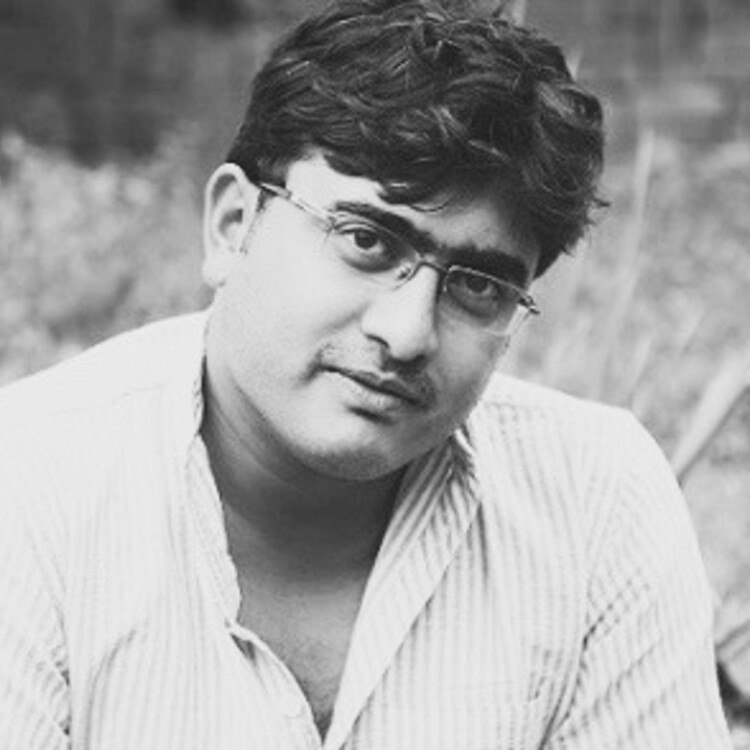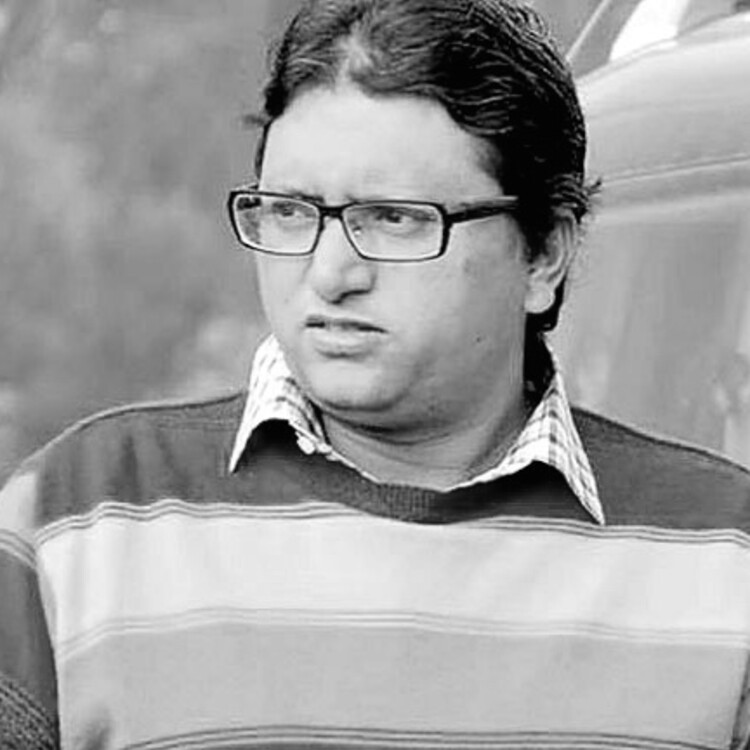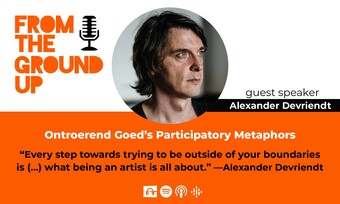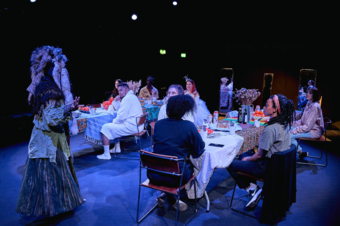An Interview with Abhishek Majumdar and Gopal Datt
In August 2013, Steve Raider-Ginsburg traveled to Bangalore, India, in order to build an artistic collaboration between HartBeat and the Indian Ensemble. This meeting provided an opportunity to experience, explore, and mediate issues of cultural difference. It also allowed the artistic leadership of both ensembles to begin to define narrative ideas along with crafting a sustainable strategy to move a collaborative project, East West Stories (working title), forward. During this visit, Steve talked with the Indian Ensemble Artistic Director, Abhishek Majumdar, and actor, Gopal Datt, about East West Stories and about living and working in India as a theatre artist.

Since this first encounter, the Indian Ensemble has traveled to HartBeat’s home theatre in Connecticut, USA in September 2014 to perform their most recent work Thook (spit) as well as to spend time working with HartBeat Ensemble. Together the ensembles continued to define and build a structure for East West Stories and, more importantly, they began to share their individual cultural perspectives on their own history, homelands, and personal stories.
Both encounters were made possible, in part, through a grant from the Network of Ensemble Theaters’ Travel & Exchange Network (NET/TEN), supported by lead funding from the Andrew W. Mellon Foundation and the Doris Duke Charitable Foundation.
Steve Raider-Ginsburg: Gopal, how did you become an actor living in Bombay?
Gopal Datt: I am from a very small town in North of India. I used to do theatre in Himachal Pradesh and then I heard about the National School of Drama, which is a very prestigious institute, a government institute in India, it opened in 1962 and the founder was trained at The Royal Academy of Dramatic Arts in London. The NSD only accepts twenty students a year from the whole country.
Steve: How have things been going since you finished the NSD, auditioning and so on. How does it work here?
Gopal: When I came to Bombay, the economic capital of India, and the film city, if you are doing theatre, you can't survive, so you have to earn your bread and butter from somewhere. So I freelance a little bit in television and a little bit in film, but my main focus is on theatre. So I am doing theatre continuously. I never take a regular job in television or film because my theatre will suffer.
Steve: Do you have an agent or a manager?
Gopal: So what happens is in Mumbai, when you do theatre, people know you. The people from television and film also know you. So the agent scene is not really working in India, it works with the bigger stars. It’s very expensive to have an agent. Without an agent, it’s all about personal contacts.
Steve: Talk to me about theatre in India, about popular plays and their audiences.
Abhishek Majumdar: Out of all the countries India has the most registered theatre companies in the world. But if you compare the size of the audience, it will be very little, compared to say London, which is a strange thing isn’t it? You have so many companies, but so few people. Who are all these companies performing for? They must be performing for somebody. I think that the answer lies somewhere in the very heart of fundamentally what Indian theatre is about. Most of these registered companies are amateur companies say in railway clubs or banks and in communities, people coming together and forming a theatre company, coming together a couple of times a year to perform a play for their community.
Most of these registered companies are amateur companies say in railway clubs or banks and in communities, people coming together and forming a theatre company, coming together a couple of times a year to perform a play for their community.
Steve: Are there Indian historical, theoretical, and practical structures for theatre making?
Abhishek: There is one that is very old and very good, which is called Natya Shastra, which is like the vedas of theatre, it’s almost that old, it’s as old as the Mahabharata at least and it lays out many things very clearly.
One of the most important concepts is the concept of bhava and rasa, which is what you are playing in a scene and is what the audience is supposed to perceive. Charlie Chaplin is a very good example. He is playing sorrow, but you are laughing, which is different from him playing sorrow and you are crying. So that is a very big concept and there is a whole training methodology which has to do with just breath, how you do things with just your breath and your facial expressions.
Steve: How does it sound to you when I say that I don't know about the Natya Shastra, the ancient Indian treatise on the performing arts, is that surprising to you?
Abhishek: It's not surprising to me because whenever I travel abroad I sense two or three things: One is the export of media from America and England to the rest of the world is far greater than the export from India, because they have been traditionally the countries that have exported a lot more of their books and movies and thoughts than what has been translated and what they have received. But having said that, at least in America, I know at least two or three people, like you, friends from the US who are in a world theatre program. But I don't know anyone in India who is in a world theatre program. So in that extent I think the training is useful because there is some exposure and unfortunately, if you ask Indians, “What is American Theatre?” it will generally be a blank slate or it will be Arthur Miller, so there is no sort of concept of the other kinds of theatre like Tony Kushner and Sam Shephard and so on.
One of the things that I actually heard from Heisnam Kanhaiyalal, who is one of the major directors of India—he’s in his seventies now and lives in the North East—he once told me, “we have not converted our physical forms to theatre exercises. For example yoga, you can learn yoga as much as you want, but how do you convert it into theatre exercises?”
Steve: Have you seen some recent Western production that has integrated Eastern theatre knowledge and training?
Abhishek: I have seen some, but I have to say that unfortunately today most people in the West are just shopping. For example multilingualism is a big thing in Europe, because the French and Spanish have no common language, but in India it is such a common thing. Everybody speaks three languages. They pick this up and they put all these languages together in a play without any sense so when you are watching this as an Indian it makes no sense to you. But these shows are best sellers abroad.
Steve: Let’s talk about the word ensemble. In the US it’s fairly specific and it’s a minority group in the world of American theatre. What does ensemble mean here?
Abhishek: At the Indian Ensemble, and generally, what it means, is that there is a group of people that are going to come together to make this work, who are not necessarily from the same place, who do not necessarily speak the same language, and who are more or less sharing profits.
Steve: Are there any expectations for people who become a part of the ensemble?
Abhishek: The expectation in the ensemble is that they will fundamentally follow the structure of a large joint family, which means people who are in their middle age will do a lot of work. They have to keep in mind that there are people that are younger, in their twenties, that need to be looked after. They may or may not do theatre for a very long time, but one still has to look after them, one has to expose them to various things, send them to festivals, expose them to opportunities. There are people who are older and there are some performers who are with us and are very big performers in this country, like Arundhati Nag, who is one of the stalwarts of acting who has also been part of Indian Ensemble. I have seen Arundhati Nag sit in rehearsal with a spoon and a cough syrup to make sure that anybody who is getting a flu, so she can quickly give them that, so nobody falls ill before the show. This for me is an ensemble; it’s not just about the theatre.
Steve: In the US the ensemble movement was partly a reaction to the “star” system in theatre. Ensembles were founded to be more egalitarian so that everyone’s voice has a place and that artistically people are heard. With HartBeat Ensemble we expect an ensemble member to make HartBeat a priority and its reciprocal is true.
Abhishek: We also create systems where people will go. This is very important. We encourage young people to go and form their own companies. We want them to do that. You know we are a very strange kind of democracy in this part of the world. We are a democracy but like I said we are a joint family system, which is not always useful, not always beneficial. It also has its drawbacks, because if you are a joint family system there is a patriarchy, there is feudalism, there is scope for all that, on a bad day.
Steve: Yes, I think America might be somewhere between India and Poland. How in Poland the young want to compete with the old, they say, “that world is old and we’re going to do something better.” I think in America we respect the old, but we also want to do something new. Could you describe the current scene of theatre today in India?
Gopal: For me, Bombay is very vibrant right now, many kinds of theatre in many languages are happening. There is Gujarati theatre, which is commercially viable. There is Marathi theatre, which is sort of experimental and commercial. We have English theatre, we have Hindi theatre. Because I live in Mumbai I can see it is very vibrant and very many new ideas, new styles and languages.
Abhishek: I think that Bombay has had a long tradition of urban theatre because it is one of the oldest cities. Calcutta used to have it, but I don’t see it anymore. Dehli has the government centers and the National School of Drama. Bangalore has also had a big tradition, particularly of Kanada theatre. English theatre has this notion that it is very vibrant, but actually it’s not so vibrant.
However, most people do not want to watch theatre. It’s a fact. Life in India, for a majority of the population, is not very easy. It is quite hard. Even in cities most people are poor. Most people are not rich. Most people are nonunionized wage laborers. If they are coming to do something then they are not making any money at that time. So people want to watch things like Bollywood, which takes you away…
We are very privileged and we can afford to have these conversations, but most of the country cannot. There is no reason why they should have these philosophical questions because their philosophical question is there in the temple, the mosque.
Gopal: From the harsh realities.
Abhishek: We are very privileged and we can afford to have these conversations, but most of the country cannot. There is no reason why they should have these philosophical questions because their philosophical question is there in the temple, the mosque. It is there in the stories of the Ramayana, the Mahabarata, in the stories of the Ami Hamza or Prophet Mohammad. It’s all there so they don't have to replace that religion with the religion of the theatre.
Steve: In America we are fearing and thinking that the theatre-going audience will shrink. Here are you expecting it to grow?
Abhishek: I am.
Gopal: We hope so.
Abhishek: I am expecting it only because more people are going to schools, there is more time to philosophize.
Gopal: And now they are introducing theatre into schools.
Steve: Are there any other thoughts that you have that you would like to share in closing?
Abhishek: It would be good to have a website where we could share unpublished texts, so that artists from each country can share work with each other so we can see what kind of work that is actually happening. And if there can be along with the text they can put up documents about methodologies.












Comments
The article is just the start of the conversation—we want to know what you think about this subject, too! HowlRound is a space for knowledge-sharing, and we welcome spirited, thoughtful, and on-topic dialogue. Find our full comments policy here